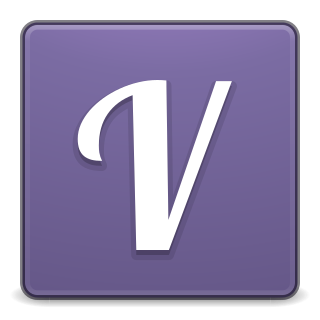The Common Object Request Broker Architecture (CORBA) is a standard defined by the Object Management Group (OMG) designed to facilitate the communication of systems that are deployed on diverse platforms. CORBA enables collaboration between systems on different operating systems, programming languages, and computing hardware. CORBA uses an object-oriented model although the systems that use the CORBA do not have to be object-oriented. CORBA is an example of the distributed object paradigm.

In computer science, inter-process communication or interprocess communication (IPC) refers specifically to the mechanisms an operating system provides to allow the processes to manage shared data. Typically, applications can use IPC, categorized as clients and servers, where the client requests data and the server responds to client requests. Many applications are both clients and servers, as commonly seen in distributed computing.
C++Builder is a rapid application development (RAD) environment, originally developed by Borland and as of 2009 owned by Embarcadero Technologies, for writing programs in the C++ programming language currently targeting Windows, iOS and for several releases, macOS and Android C++Builder combines the Visual Component Library and IDE written in Object Pascal with multiple C++ compilers. Most components developed in Delphi can be used in C++Builder with no or little modification, although the reverse is not true, but this constraint is valid only for source code. Binary code generated by Delphi can easily be linked to binary code generated by C++Builder and vice versa to generate an executable written in both Object Pascal and C++. With this approach, C++ can be called from Object Pascal and vice versa. Since both Delphi and C++ use the same back end linker, the debugger can single step from Delphi code into C++ transparently.
The Visual Component Library (VCL) is a visual component-based object-oriented framework for developing the user interface of Microsoft Windows applications. It is written in Object Pascal.

Delphi is a general-purpose programming language and a software product that uses the Delphi dialect of the Object Pascal programming language and provides an integrated development environment (IDE) for rapid application development of desktop, mobile, web, and console software, currently developed and maintained by Embarcadero Technologies.
In computer programming, a callback or callback function is any reference to executable code that is passed as an argument to another piece of code; that code is expected to call back (execute) the callback function as part of its job. This execution may be immediate as in a synchronous callback, or it might happen at a later point in time as in an asynchronous callback. Programming languages support callbacks in different ways, often implementing them with subroutines, lambda expressions, blocks, or function pointers.
In computer science, message passing is a technique for invoking behavior on a computer. The invoking program sends a message to a process and relies on that process and its supporting infrastructure to then select and run some appropriate code. Message passing differs from conventional programming where a process, subroutine, or function is directly invoked by name. Message passing is key to some models of concurrency and object-oriented programming.

XMLHttpRequest (XHR) is an API in the form of an object whose methods transfer data between a web browser and a web server. The object is provided by the browser's JavaScript environment. Particularly, retrieval of data from XHR for the purpose of continually modifying a loaded web page is the underlying concept of Ajax design. Despite the name, XHR can be used with protocols other than HTTP and data can be in the form of not only XML, but also JSON, HTML or plain text.

Twisted is an event-driven network programming framework written in Python and licensed under the MIT License.
In computer science, asynchronous I/O is a form of input/output processing that permits other processing to continue before the transmission has finished.

In distributed computing, distributed objects are objects that are distributed across different address spaces, either in different processes on the same computer, or even in multiple computers connected via a network, but which work together by sharing data and invoking methods. This often involves location transparency, where remote objects appear the same as local objects. The main method of distributed object communication is with remote method invocation, generally by message-passing: one object sends a message to another object in a remote machine or process to perform some task. The results are sent back to the calling object.
In computer science, future, promise, delay, and deferred refer to constructs used for synchronizing program execution in some concurrent programming languages. They describe an object that acts as a proxy for a result that is initially unknown, usually because the computation of its value is not yet complete.

RPyC, or Remote Python Call, is a Python library for remote procedure calls (RPC), as well as distributed computing. Unlike regular RPC mechanisms, such as ONC RPC, CORBA or Java RMI, RPyC is transparent, symmetric, and requires no special decoration or definition languages. Moreover, it provides programmatic access to any pythonic element, be it functions, classes, instances or modules.

Vala is an object-oriented programming language with a self-hosting compiler that generates C code and uses the GObject system.
In a distributed computing environment, distributed object communication realizes communication between distributed objects. The main role is to allow objects to access data and invoke methods on remote objects. Invoking a method on a remote object is known as remote method invocation (RMI) or remote invocation, and is the object-oriented programming analog of a remote procedure call (RPC).
Component Object Model (COM) is a binary-interface standard for software components introduced by Microsoft in 1993. It is used to enable inter-process communication object creation in a large range of programming languages. COM is the basis for several other Microsoft technologies and frameworks, including OLE, OLE Automation, Browser Helper Object, ActiveX, COM+, DCOM, the Windows shell, DirectX, UMDF and Windows Runtime. The essence of COM is a language-neutral way of implementing objects that can be used in environments different from the one in which they were created, even across machine boundaries. For well-authored components, COM allows reuse of objects with no knowledge of their internal implementation, as it forces component implementers to provide well-defined interfaces that are separated from the implementation. The different allocation semantics of languages are accommodated by making objects responsible for their own creation and destruction through reference-counting. Type conversion casting between different interfaces of an object is achieved through the QueryInterface method. The preferred method of "inheritance" within COM is the creation of sub-objects to which method "calls" are delegated.
In multithreaded computer programming, asynchronous method invocation (AMI), also known as asynchronous method calls or the asynchronous pattern is a design pattern in which the call site is not blocked while waiting for the called code to finish. Instead, the calling thread is notified when the reply arrives. Polling for a reply is an undesired option.
RemObjects Software is an American software company founded in 2002 by Alessandro Federici and Marc Hoffman. It develops and offers tools and libraries for software developers on a variety of development platforms, including Embarcadero Delphi, Microsoft .NET, Mono, and Apple's Xcode.
In computer programming, the async/await pattern is a syntactic feature of many programming languages that allows an asynchronous, non-blocking function to be structured in a way similar to an ordinary synchronous function. It is semantically related to the concept of a coroutine and is often implemented using similar techniques, and is primarily intended to provide opportunities for the program to execute other code while waiting for a long-running, asynchronous task to complete, usually represented by promises or similar data structures. The feature is found in C# 5.0, C++11, Python 3.5, F#, Hack, Julia, Dart, Kotlin 1.1, Rust 1.39, Nim 0.9.4, JavaScript ES2017, Swift 5.5 and Zig, with some experimental work in extensions, beta versions, and particular implementations of Scala.
Smart Pascal is a dialect of the Object Pascal computer language that is derived from Delphi Web Script, but is enhanced and adapted for Smart Mobile Studio, a commercial development suite that generates JavaScript rather than machine code.





